Facts about Palestine
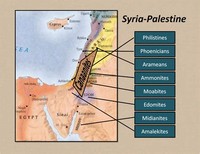
The land Syria-Palestine, known to Egyptians as Retenu, was divided into three administrative districts, each under an Egyptian governor.

During the nineteenth century, the Ottoman Government employed the term Arz-i Filistin (the "Land of Palestine") in official correspondence, meaning the area to the west of the River Jordan.

Up to World War I, the word "Palestine" was used informally for a region that extended in the north-south direction typically from south-east of Gaza to the Litani River (later in Lebanon).

Enmity between Umayyads and Abbasids became a political factor in Palestine, and pro-Umayyad uprisings were frequent.
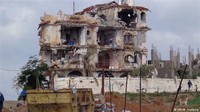
Evidence for an Israelite presence in Palestine has been found from only six years after the end of the reign of Rameses II, in the Merneptah Stele, documenting military campaigns in Canaan.
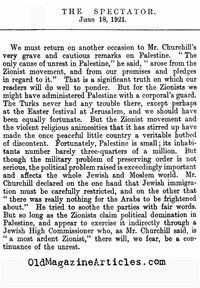
British attempts to prevent Jewish immigration to Palestine in the face of the Holocaust led to the disastrous sinking of two ships carrying Jewish refugees—the Patria (November 1940) and the Struma (February 1942).

After Abbasid authority was restored, Palestine came under Ikhshidid rule (935–969).
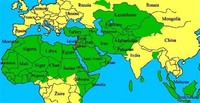
Rising nationalism in Egypt and Syria, increasing unemployment in Palestine and a poor citrus harvest touched off an Arab revolt, which lasted from 1936–1939.
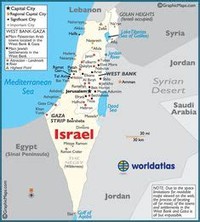
Different geographic definitions of Palestine have been used over the millennia, and these definitions themselves are politically contentious.

Among the educated Arab public, Filastin was a common concept, referring either to the whole of Palestine or to the Jerusalem sanjaq alone, or just to the area around Ramle.
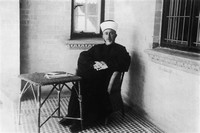
In 1948, Amin al-Husseini declared a short-lived government of All Palestine in the Gaza Strip.
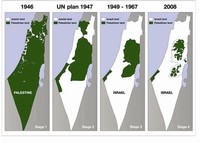
Until Israel was established, the term “Palestinian” was used by Jews and foreigners to describe the inhabitants of Palestine.

The Palestine Liberation Organization (PLO) was formed after an Arab summit meeting in Cairo in 1964.

The Ghassulian period was an archaeological stage dating to the Middle Chalcolithic Period (Copper Age) in southern Palestine (c. 3800–3350 B.C.E.).

An umbrella organization of several Palestinian groups, the PLO, which claimed to be the sole representative of Palestinian people, sought an independent state, to liberate Palestine, and destroy the State of Israel.

The British Mandate of Palestine lasted from 1920 to 1948, and covered territories later comprising Jordan, Israel and territories governed in different degrees of control by the Palestinian Authority.

During World War I, the great powers made a number of decisions about Palestine without regard to the people of the region.

The Arab League, formed in March 1945, appointed an Arab Higher Executive for Palestine, and later declared a boycott of Zionist goods.

In 1839, 268,199 gallons of cider were exported to England alone, but by 1870, when beer became a more popular drink, cider exports from Jersey had slumped to 4632 gallons.

The hope of founding an Arab Palestine within a federated Syrian state collapsed.
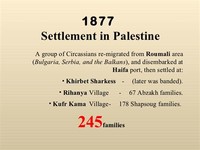
Many Circassians and Bosnian Muslims were settled in the north of Palestine by the Ottomans in the early nineteenth century.

The Fatimids established precarious control over Palestine, where they faced opposition from Qarmatians, Seljuks, Byzantines, and Bedouins.

Palestine formed a part of the district of Damascus under the rule of the Mamluk Sultanate and was divided into three smaller districts with capitals in Jerusalem, Gaza, and Safad.

The Mamluk armies were eventually defeated by the forces of the Ottoman Sultan, Selim I, and lost control of Palestine after the 1516 battle of Marj Dapiq.

Palestine was often reduced to a battlefield, although Jerusalem, Nablus, and Askalan were expanded and renovated under their rule.

Other groups included the Popular Front for the Liberation of Palestine, the Democratic Front for the Liberation of Palestine, the Popular Front for the Liberation of Palestine – General Command, and the Syrian-backed al-Saiqah.

The Jewish Kingdom of Judea controlled most of the region of Palestine (without the Negev but with the West Bank, Golan, and parts of the Gaza Strip) and parts of eastern Jordan.

On May 14, the British high commissioner left Palestine, and the State of Israel was declared, recognized by the United States and the Soviet Union.

In 1516 the Ottoman Turks occupied Palestine, and the country became part of the Ottoman Empire.

Palestine thus became a center for pilgrims and ascetic life for men and women from all over the world.

In April 1920, by which time Jews made up 11 percent of the population of Palestine, anti-Zionist riots broke out in Jerusalem, killing several and injuring many.

Jund Filastin (Arabic ??? ??????, literally "the army of Palestine") was a region extending from the Sinai to the plain of Acre.

The demands of foreign bureaucrats, combined with internal decay, had weakened the Canaanite vassal princes of Palestine.

In 400 B.C.E., the Nabataeans made inroads into southern Palestine and built a separate civilization in the Negev that lasted until 160 B.C.E.

At the end of their service life, the satellites in geostationary orbit are decommissioned.
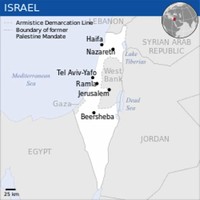
Palestine became the formal name of the entity in English and Arabic while Palestina (Eretz Yisrael) ((??????? (?"?) was the formal name in Hebrew.

In 1799 Napoleon announced a plan to re-establish a Jewish state in Palestine which was mostly to curry favor with Haim Farkhi, Jewish finance minister and advisor to the Pasha of Syria/Palestine.

The term "pancreas" is derived from the Greek pan, meaning "all," and kreas, meaning "flesh" (Harper 2007).

On September 22, 1974, the UN General Assembly included the “Palestine question” as a separate subject for debate, and on November 13, Arafat put his case to the assembly.

Anyone born after that date, of a Palestinian father — whether in Palestine or outside it — is also a Palestinian."

witnessed the foundation of perhaps hundreds of insignificant, unprotected village settlements, many in the mountains of Palestine.
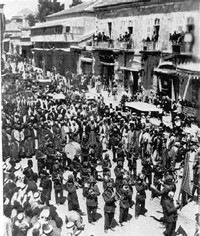
In August 1945, U.S. President Harry S. Truman asked British Prime Minister Clement Attlee to allow 100,000 Jewish Holocaust survivors into Palestine.

Jews were permitted to return to Palestine for the first time since the five-hundred-year ban enacted by the Romans and maintained by Byzantine rulers.

After the Ottoman conquest, the name "Palestine" disappeared as the official name of an administrative unit, as the Turks often called their (sub)provinces after the capital.

Following the expulsions from Spain, the Jewish population of Palestine rose to around 25 percent (including non-Ottoman citizens, and excluding Bedouins) and regained its former stronghold of Eastern Galilee.

The Umayyads paid special attention to Palestine—it was important in their struggle against Iraq and the Arabian Peninsula.

Barak and Palestine Liberation Organization head Yassir Arafat negotiated with U.S. President Bill Clinton at a summit at Camp David in July 2000.

The third district, Canaan, included all of Palestine from the Egyptian border to Byblos.

Under Umayyad rule (661–750), the province of ash-Sham (Greater Syria), of which Palestine was a part, was divided into five districts, and was one of the main provinces of the empire.

The November 15, 1988, proclamation of a State of Palestine by the PLO referred to a country called Palestine, defining its borders based on the U.N.

Formal use of the English word "Palestine" returned with the British Mandate, which enacted English, Hebrew and Arabic as its three official languages.

Palestine was not as central to the Baghdad-based Abbasid rulers (750-969 ), though the Abbasid Caliphs did visit the holy shrines and sanctuaries in Jerusalem and continued to build up Ramleh.

The Palestine Jewish community set up its own assembly (Va'ad Leumi), labor movement (Histadrut), schools, courts, taxation system, medical services, industrial enterprises, and a military organization called the Haganah.

The name Palestine has long been used as a general term for a region without precise boundaries.

Palestine sustained an insurrection in 903–906 of the Qarmatians, an Isma’ili Shi'ite sect.

On August 31, the UN Special Committee on Palestine recommended that the region be partitioned into an Arab and a Jewish state, with Jerusalem and its environs an international zone.

On March 19, 1948, the United States urged the UN Palestine Commission to suspend its actions, and on March 30 it called for a truce.
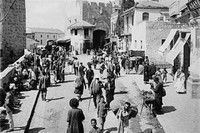
People from this era lived in small hamlet settlements, and migrated southwards from Syria into Palestine.

In 638 Caliph Umar and Safforonius, the Byzantine governor of Jerusalem, signed The Umariyya Covenant, an agreement that stipulated the rights and obligations of all non-Muslims in Palestine.
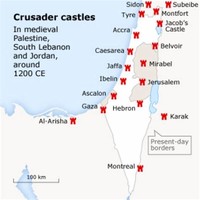
Under the European rule, fortifications, castles, towers and fortified villages were built, rebuilt and renovated across Palestine, largely in rural areas.

Palestinians are represented before the international community by the Palestine Liberation Organization (PLO).

The discovery of the "Palestine Man" in the Zuttiyeh Cave in Wadi Al-Amud near Safad in 1925 provided some clues to human development in the area.

The name Palestine has long been used as a general term for a region without precise boundaries.




